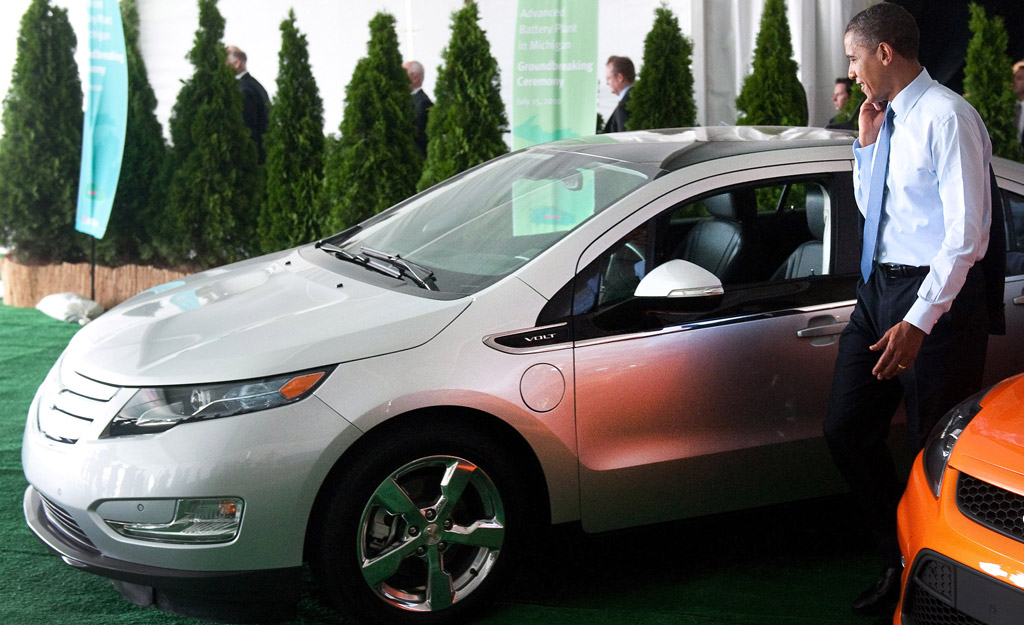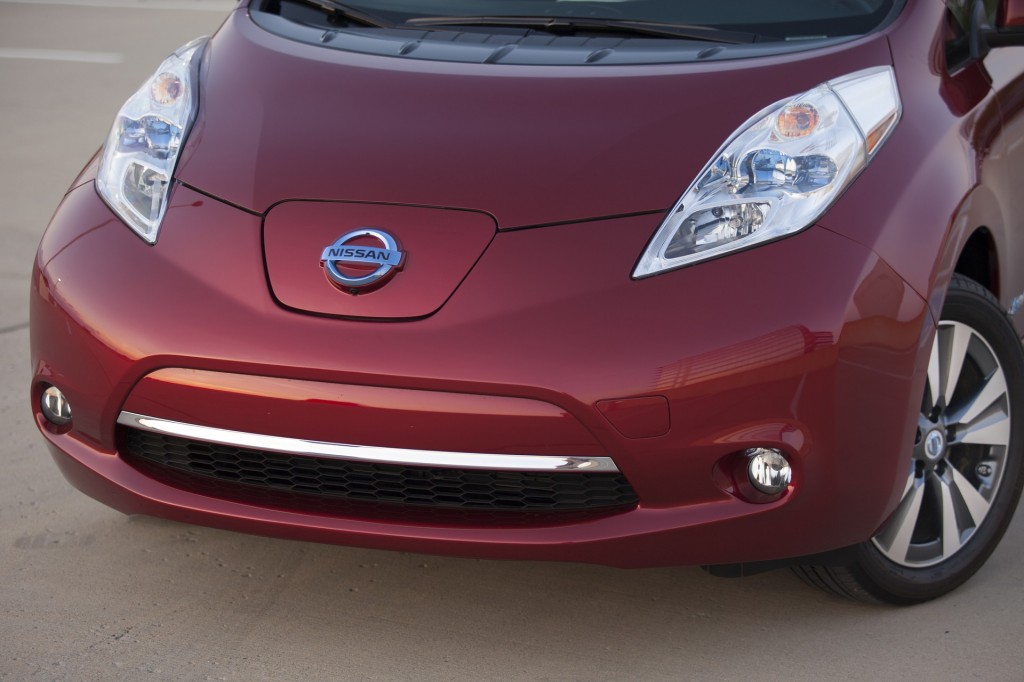It's been no secret that President Obama's goal of 1 million plug-in electric cars on U.S. roads won't be met by the end of this year.
That's the goal he announced on the campaign trail toward winning his first term in 2008.
The actual number is likely to be perhaps 400,000 or so; the 1-million goal may not be met until 2018 or later.
DON'T MISS: Will 2015 Plug-In Electric Car Sales Exceed Last Year's Total?
Every now and then, a reporter notices this fact, and an article or video segment appears to point this out.
Last week, for instance, Bloomberg published an article whose title suggested it might be broadly unsympathetic to the idea that electric cars will grow in number.

President Obama inspects the 2011 Chevrolet Volt
But despite that title--"Obama Scales Back Overly Ambitious Goals For Electric-Car Use"--the article came to roughly the same conclusion that most savvy industry analysts and observers have.
That is, sales of plug-in electric cars in the U.S. (and around the world) will grow as battery costs fall steadily
At the same time, gasoline-vehicle prices will be rising to cover the increasing costs of technology that lets them use less fuel, to keep their makers in compliance with steadily higher corporate average fuel economy rules through 2025.
CHECK THIS OUT: Hey, Media: Electric Cars Aren't Hybrids, The Difference Matters
Bloomberg reporter Jeff Green includes in his piece a quotation from Daniel Becker, director of the Safe Climate Campaign--which lobbies for regulations that require more-efficient vehicles.
“The ground is being laid for an electric car future,” Becker told him. “But it’s not an electric car present.”
Many observers, including this author, feel that the true "hockey stick" upswing in sales of plug-in cars won't come until they are roughly price competitive with gasoline vehicles in the same segment.

2015 Nissan Leaf
That is, when the base price of a Nissan Leaf is within $1,000 to $2,500 the price of, say, a Nissan Sentra or Altima, then the electric car will get far more attention from average buyers.
The prices needn't be identical, but close enough where they're a viable increase for that buyer--perhaps equivalent to the difference between the base model and the highest trim level of any given car.
At that point, the more cost-conscious member of the couple will be far more receptive to the idea that cars running on grid power cost one-fifth to one-third as much per mile as even the more efficient gasoline cars.
MORE: Who Buys Plug-In Electric Cars, And Why? CA Report Explains It All For You
Major technology innovations or major transitions customarily go through a cycle of excitement, over-promising, hype, missed expectations, disappointment, and general public disinterest before they start to permeate everyday life.
Think, most recently, of the mid-1990s advent of the Internet.
But the same applies to railroads, automobiles, and many other advances that are now part of our everyday lives.
![Tesla Model S lithium-ion battery pack in rolling chassis [photo: Martin Gillet via Flickr] Tesla Model S lithium-ion battery pack in rolling chassis [photo: Martin Gillet via Flickr]](https://images.hgmsites.net/lrg/tesla-model-s-lithium-ion-battery-pack-in-rolling-chassis-photo-martin-gillet-via-flickr_100481091_l.jpg)
Tesla Model S lithium-ion battery pack in rolling chassis [photo: Martin Gillet via Flickr]
With battery costs historically falling at 7 percent a year--while a gasoline vehicle will rise $3,000 (in real dollars) between 2012 and 2025 to meet CAFE standards, according to the EPA--the higher price of electric cars will decline steadily.
The year at which electric cars begin to enter the mainstream is open to debate, and those debates occur with great intensity.
It is pretty unlikely that Nissan CEO Carlos Ghosn's famous prediction that 10 percent of his company's global production in 2020 would be electric will be met.
But from 2008 through the present, the tone of analysts and industry executives has shifted notably.
![2011 Chevrolet Volt and 2013 Tesla Model S [photo: David Noland] 2011 Chevrolet Volt and 2013 Tesla Model S [photo: David Noland]](https://images.hgmsites.net/med/2011-chevrolet-volt-and-2013-tesla-model-s-photo-david-noland_100427530_m.jpg)
2011 Chevrolet Volt and 2013 Tesla Model S [photo: David Noland]
Now, electric cars are an accepted niche in the car market--and virtually every informed observer expects their volumes to grow steadily.
They just won't grow as quickly as the earliest and most enthusiastic proponents expected: then-Senator Barack Obama among them.
Plus ça change, plus c'est la même chose.
_________________________________________________













